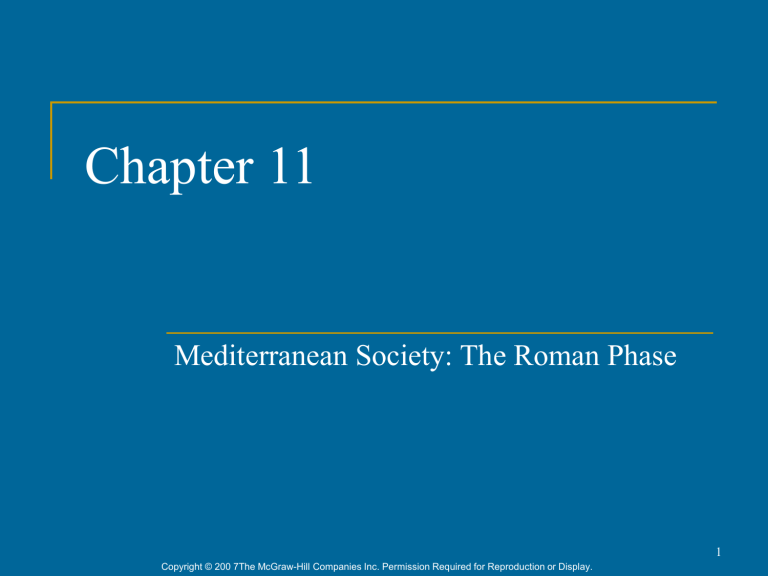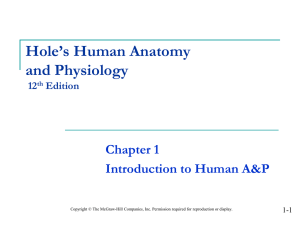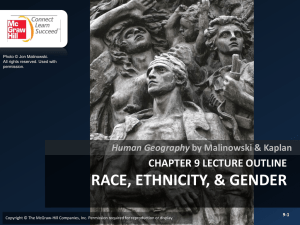Chapter 11 PowerPoint with Maps

Chapter 11
Mediterranean Society: The Roman Phase
Copyright © 200 7The McGraw-Hill Companies Inc. Permission Required for Reproduction or Display.
1
Establishment of Rome
Legend of Romulus and Remus
Rome Founded 753 BCE
Indo-European migrants c. 2000 BCE
Bronze c. 1800 BCE, Iron c. 900 BCE
Copyright © 2007 The McGraw-Hill Companies Inc. Permission Required for Reproduction or Display.
2
The Etruscans
Originally from Anatolia
Colonized Roman regions
Society declines late 6 th c. BCE
Greek maritime attacks
Celtic invasions from north
Copyright © 2007 The McGraw-Hill Companies Inc. Permission Required for Reproduction or Display.
3
The Kingdom of Rome
Monarchy through 7 th -6 th c. BCE
Streets, temples, public buildings
Major center of trade routes
Copyright © 2007 The McGraw-Hill Companies Inc. Permission Required for Reproduction or Display.
4
Establishment of the Republic
509 BCE Romans overthrow last Etruscan king
Roman forum built
Republican constitution
Executive: 2 consuls
Senate
Copyright © 2007 The McGraw-Hill Companies Inc. Permission Required for Reproduction or Display.
5
Social Conflict
Patricians (aristocrats)
Plebeians (commoners)
Major class conflict 5 th c. BCE
Plebeians allowed to elect tribunes for representation
Rights expanded through 3 rd c. BCE
Constitution allowed for dictators to be appointed in times crises
Copyright © 2007 The McGraw-Hill Companies Inc. Permission Required for Reproduction or Display.
6
Expansion of the Republic
Dominated Etruscans
Took over iron industry 5 th -4 th c. BCE
Expansion via military threat and incentives
Tax exemptions
Trade privileges
Citizenship
Copyright © 2007 The McGraw-Hill Companies Inc. Permission Required for Reproduction or Display.
7
The Punic Wars
Conflict with Carthage, 264-164 BCE
Three major wars over Sicilian grain supply
Later conflict with declining Hellenistic Empires
Rome dominates Mediterranean by middle of 2 nd
C. BCE
Copyright © 2007 The McGraw-Hill Companies Inc. Permission Required for Reproduction or Display.
8
Imperial Expansion and Domestic
Problems
Land distribution
Perennial problem
Development of large plantations latifundia
Unfair competition for smaller landholders
Copyright © 2007 The McGraw-Hill Companies Inc. Permission Required for Reproduction or Display.
9
Expansion of the Roman republic to 133 BCE
Copyright © 2007 The McGraw-Hill Companies Inc. Permission Required for Reproduction or Display.
10
The Gracchi Brothers
Tiberius and Gaius
Attempted to limit land holdings of aristocrats
Assassinated
Development of private armies made up of landless peasants
Gaius Marius (with reformers)
Lucius Cornelius Sulla (with aristocrats)
Copyright © 2007 The McGraw-Hill Companies Inc. Permission Required for Reproduction or Display.
11
Civil War
87 BCE Gaius Marius takes Rome
Lucius Cornelius Sulla drives Marius out 83 BCE
Reign of terror follows
Copyright © 2007 The McGraw-Hill Companies Inc. Permission Required for Reproduction or Display.
12
Julius Caesar
Nephew of Marius
Escapes Sulla’s terror
Relatively young, well-timed trip abroad
Rises in popularity
Public spectacles, victories in Gaul
Attacks Rome 49 BCE
Names self Dictator for life in 46 BCE
Copyright © 2007 The McGraw-Hill Companies Inc. Permission Required for Reproduction or Display.
13
Caesar’s Policies
Centralized military, governance under personal control
Redistribution of land to war veterans, other allies
Major building projects reduce urban unemployment
Extended citizenship to provinces
Aristocrats threatened, assassinate Caesar in 44
BCE
14
Copyright © 2007 The McGraw-Hill Companies Inc. Permission Required for Reproduction or Display.
Augustus
Civil conflict follows death of Caesar
Power belongs to Octavian
Octavian defeats Mark Antony & Cleopatra
Takes title Augustus 27 BCE
Copyright © 2007 The McGraw-Hill Companies Inc. Permission Required for Reproduction or Display.
15
Augustus’ Administration
Monarchy disguised as a republic
Increasing centralization of political, military power
Stabilized empire
Death in 14 CE
Copyright © 2007 The McGraw-Hill Companies Inc. Permission Required for Reproduction or Display.
16
Expansion and Integration of Empire
Roman occupation of increasingly remote areas
Gaul, Germany, Britain, Spain
Coordination of crop production, transport of natural resources
Developed infrastructure, cities emerge
Copyright © 2007 The McGraw-Hill Companies Inc. Permission Required for Reproduction or Display.
17
The Roman Empire, about 117 CE
Page 308 Bentley 4e
Copyright © 2007 The McGraw-Hill Companies Inc. Permission Required for Reproduction or Display.
18
Pax Romana: “Roman Peace”
27-250 CE
Facilitated trade, communication
Roadwork
Curbs
Drainage
Flat paving stones
Milestones
Postal service
Copyright © 2007 The McGraw-Hill Companies Inc. Permission Required for Reproduction or Display.
19
Roman Law
Twelve Tables, c. 450 BCE
Adapted to diverse populations under Roman
Rule
Innocent until proven guilty
Right to challenge accusers in court
Copyright © 2007 The McGraw-Hill Companies Inc. Permission Required for Reproduction or Display.
20
Commercial Agriculture and Trade
Latifundia: production for export
Regional specialization increases
Integration of Empire-wide economy
Mediterranean Sea: Mare Nostrum,
“our sea”
Copyright © 2007 The McGraw-Hill Companies Inc. Permission Required for Reproduction or Display.
21
The City of Rome
Cash flow
Taxes, tribute, spoils, commerce
Massive construction projects
Statuary, monumental architecture, aqueducts
Technology: concrete
Copyright © 2007 The McGraw-Hill Companies Inc. Permission Required for Reproduction or Display.
22
Roman Attractions
Imported goods
Underground sewage
Circus Maximus
250,000 spectators
Colosseum
Gladiatorial Games
Copyright © 2007 The McGraw-Hill Companies Inc. Permission Required for Reproduction or Display.
23
Family and Society
Pater Familias : “father of the family”
Right to arrange marriages, sell children into slavery
Women not allowed to inherit property
Rarely enforced
Copyright © 2007 The McGraw-Hill Companies Inc. Permission Required for Reproduction or Display.
24
Wealth and Social Change
Newly rich challenge aristocracy
Yet poor class increasing in size
Distraction: “Bread and Circuses”
Copyright © 2007 The McGraw-Hill Companies Inc. Permission Required for Reproduction or Display.
25
Slavery
2 nd c. CE: estimated at 1/3 of Empire population
Customary manumission at age 30
Agricultural work, quarries, mines
Chain labor
Revolt under Spartacus, 73 BCE
Copyright © 2007 The McGraw-Hill Companies Inc. Permission Required for Reproduction or Display.
26
Roman Deities
Polytheistic
Major gods
Tutelary deities
Absorption of gods from other cultures
Copyright © 2007 The McGraw-Hill Companies Inc. Permission Required for Reproduction or Display.
27
Cicero and Stoicism
Marcus Tullius Cicero (106-46 BCE)
Major orator, writer
Influenced by Greek thought
Proponent of Stoicism
Copyright © 2007 The McGraw-Hill Companies Inc. Permission Required for Reproduction or Display.
28
Mithraism
From Zoroastrian myth: god of Sun, light
Roman version emphasizes strength, courage, discipline
Women not admitted into cult
Appealed to military
Cult of Isis also popular
Copyright © 2007 The McGraw-Hill Companies Inc. Permission Required for Reproduction or Display.
29
Judaism in Early Rome
Jewish monotheism at odds with most ancient cultures
Refusal to recognize state gods
Repeated Jewish rebellions
Romans finally crush Jewish self-governance in
Jewish Wars (66-70 CE)
Copyright © 2007 The McGraw-Hill Companies Inc. Permission Required for Reproduction or Display.
30
Synagogue at Capernaum
Copyright © 2007 The McGraw-Hill Companies Inc. Permission Required for Reproduction or Display.
31
The Essenes
Messianic Jewish Cult
Baptism
Ascetic lifestyle
Dead Sea Scrolls
Copyright © 2007 The McGraw-Hill Companies Inc. Permission Required for Reproduction or Display.
32
Jesus of Nazareth
Jewish teacher
Moral code, reputation for miracle-working
Romans fear instigation of rebellion, crucify Jesus
Copyright © 2007 The McGraw-Hill Companies Inc. Permission Required for Reproduction or Display.
33
Jesus’ Early Followers
Belief in Jesus’ resurrection, divine nature
Title Christ: “Anointed One”
Teachings recorded in New Testament
Copyright © 2007 The McGraw-Hill Companies Inc. Permission Required for Reproduction or Display.
34
Paul of Tarsus
Extends teachings far beyond Jewish circles
Traveled widely throughout the Roman Empire
Missionary activity
Copyright © 2007 The McGraw-Hill Companies Inc. Permission Required for Reproduction or Display.
35
Early Christian Communities
Local leaders: Bishops
Regional variation in doctrine and ritual
Nature of resurrection
Role of women
Gradual acceptance of core texts
Copyright © 2007 The McGraw-Hill Companies Inc. Permission Required for Reproduction or Display.
36
Growth of Early Christianity
Roman persecution
Yet dramatic expansion of Christianity
Especially with dispossessed, disenfranchised classes
Urban poor women
Copyright © 2007 The McGraw-Hill Companies Inc. Permission Required for Reproduction or Display.
37







